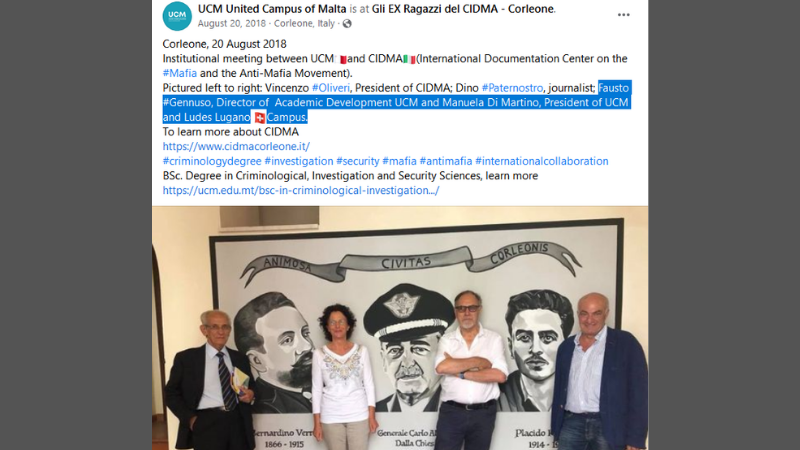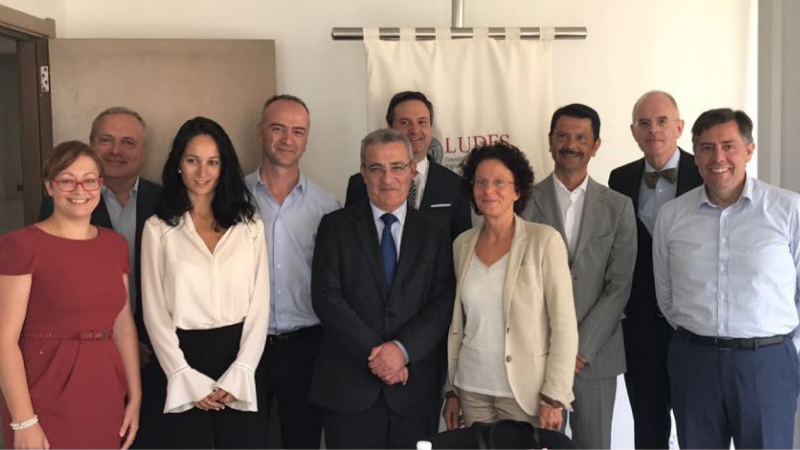Concerns about Malta’s reputation as an educational hub have been raised by multiple sources familiar with the operations of the United Campus of Malta (UCM), a higher education institution whose licence to operate on local shores was revoked after a six-year window in which students sat for accelerated courses related to different fields in public health.
In addition, The Shift has learned that up to July of last year, the institution listed an individual accused of fraud and embezzlement in Italy, Fausto Gennuso, as its academic director, according to Italian portal Il Centro.
Sources flagged UCM’s ongoing dispute with Maltese authorities due to concerns over whether students sitting for UCM’s courses would have the ability to work in the fields they studied following the revocation of UCM’s licence and an official notice posted by French authorities seeking to warn of their intent to not recognise diplomas from UCM or its partner universities.
UCM, which is linked with other similar entities in Italy and France which were hit by legal troubles in recent years, was forced to shut down its operations last year following a quality audit that flagged multiple administrative and curricular shortcomings.
The Shift is informed that students from UCM are pushing for registration approval through the Council for Professions Complementary to Medicine (CPCM), seeking to be licenced after completing a course through the institution.
UCM is currently embroiled in a legal appeal over the Malta Further & Higher Education Authority’s (MFHEA) decision to revoke its accreditation.
In an announcement published in August 2021, the MFHEA stated that “UCM shall not operate as a Higher Educational Institute under the Maltese licence” and that “any programmes accredited by MFHEA and awarded by United Campus of Malta cannot continue to be offered by United Campus of Malta or any other institutions”.
The MFHEA revoked UCM’s licence to operate following a quality audit that flagged several shortcomings, including the lack of a comprehensive quality assurance system, procedures for ensuring against academic fraud, and procedures to verify the identity of enrolled students.
The same audit also highlighted shortcomings in terms of missing annual financial statements for 2018 and 2019, pending VAT returns and tax dues amounting to €439,718 in June 2020 and serious concerns related to the company’s financial status being listed as ‘an ongoing concern’.
In its responses to The Shift’s questions, UCM said it considers the decision to revoke its licence as “illegal and arbitrary”, without providing any immediate detail.
UCM former academic director, Fausto Gennuso, who also held the position of director-general of an online university named Unidav, is facing charges of embezzlement and using credit cards for gambling in casinos last October. While Gennuso had plea-bargained, the request was rejected.

UCM was established in Malta in 2015; then-education minister Evarist Bartolo was photographed in a meeting with the Strategic Committee of LUDES, a Swiss affiliate of UCM, in 2017.
According to Italian prosecutors, Gennuso was one of the executives in charge when the Unidav scandal, which saw €900,000 being siphoned out of the online university, occurred. €350,000 of those funds were eked out through a fraudulent contract with a now-defunct Maltese company, Eduworld Holdings.
Currently, Gennuso awaits his trial, while his associate and former Unidav administrative council member Lorenzina Zampedri, who was also a stakeholder in Eduworld Holdings, is serving a prison sentence following her involvement in Unidav’s operations.
At least two other executives, Ciro Barbato and Franco Cuccurullo, and a businessman linked with Unidav, Luigi Salesi, were also arrested and charged.
In its responses, UCM argued that Gennuso was removed from his position at the institution on 6 July 2021, adding that he was “terminated for disloyal activities against the institution as a result of the audit report”.
“He is no longer part of UCM since that date. All UCM staff were terminated after the audit,” was the institution’s response to The Shift’s questions about why Gennuso did not raise any red flags despite the charges he was facing.
“We would like to emphasise that at the time of Fausto Gennuso’s hiring in November 2018, he presented himself with a CV suitable for the position, titled references issued by several Italian universities and documentation that was deemed suitable and valid to fill the position as head of the institution also by MFHEA,” the response continued.
The institution further maintained it was not aware of the ongoing investigation against Gennuso, stating it only learned of the judgement when it appeared in the news in October of last year. The Shift’s research unearthed reports about Gennuso’s troubles with the law going back as far as at least June 2019.
“At the same time as the firing, UCM – in the person of the President – denounced Fausto Gennuso to the criminal authorities for illegal misappropriation of funds. Investigations are still ongoing and civil proceedings have also been initiated for the recovery of these funds,” UCM added.
A chequered past
Besides being linked with the now-defunct Unidav in Italy through Gennuso, UCM is also linked with a host of other educational institutions which have had serious brushes with the law of their respective host countries.
CLESI, which according to French news portals had renamed itself to Europe-Eduss, was founded by Bruno Ravaz. In November 2017, a French court prohibited CLESI from providing physiotherapy courses to its students in France because the institution lacked the permission to do so. In response, the institution changed its tack and began sending its students overseas.
In September 2016, CLESI was prohibited from providing odontology courses. In December 2018, CLESI was forced to pay the Federation of Liberal Dental Unions as much as €455,000 for continuing to provide odontology courses which began in France and were then completed in partner universities like UCM.
In June 2021, France’s National Council for Masseurs and Physiotherapists issued a formal warning specifically calling out diplomas issued through UCM and its partner universities, stating that “under no circumstances should these diplomas give rise to an authorization to practice on the national territory”.
UCM’s response to the French authority’s formal warning referred to a European directive on the recognition of professional qualifications to state that recognition occurs through the CPCM (the national institution responsible for ensuring validity) rather than the French authority and that they can only go to other EU countries after doing so, describing its statement as “neither understandable nor compliant with the directive” while further stating that UCM was “regularly authorised and accredited by the Maltese Authority” to provide its certificates.
The Shift is informed that students who sat for UCM’s courses are facing difficulties to pass the requirements for CPCM registration. The statement from the French authority of masseurs and physiotherapists might have served as a warning shot to Maltese authorities that were meant to monitor UCM, a partner CLESI, the same institution that French authorities had already challenged, and how students reading for similar courses could then possibly attempt to apply for a licence to practice.
Questions have been sent to the office of the Superintendent of Public Health given that the CPCM falls under the remit of that office. A spokesperson for that office told this newsroom that “an acting registrar has been appointed for the Council for Professions Complementary to Medicine as of 21 December 2021 as the post was not filled through various public calls”.
“CPCM has been meeting on evaluation of any applications with the last meeting being held last week on 16 March. This is an independent council and this office is not involved in the decisions taken by the council,” the spokesperson for public health said.














really really well done! complete and exhaustive, that’s (part of) the shocking truth